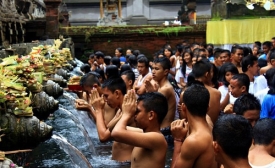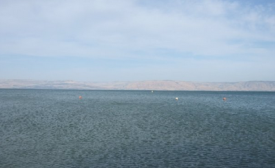water diplomacy
In December 2012, Shaun Donovan, the secretary of Housing and Urban Development, was on vacation in Berlin when he decided to detour to the Netherlands. He wanted to get a firsthand sense of the famed Dutch approach to water management.

With World Water Day coming up on March 22nd, this is a great time to consider the public diplomacy aspects of global water issues. CPD has a number of valuable resources right here on our site. Highlights include:
On December 9, 2013 at the World Bank senior officials from the Israeli, Jordanian, and Palestinian governments signed a Memorandum of Understanding (MoU) to jointly manage the shared water resources of the Red Sea, Jordan River, and the Sea of Galilee (commonly known as the Lake Tiberias or the Kineret).

On December 9, 2013 at the World Bank senior officials from the Israeli, Jordanian, and Palestinian governments signed a Memorandum of Understanding (MoU) to jointly manage the shared water resources of the Red Sea, Jordan River, and the Sea of Galilee (commonly known as Lake Tiberias or the Kineret).
Peace talks are under way again in Jerusalem. If the past is any guide, the two sides are stymied over difficult issues like settlements and borders. The negotiators badly need a new approach, and one is right beneath their feet, in the Kidron Valley, the deep ravine that runs from the Old City through the West Bank toward the Dead Sea.
Ethiopia's decision to begin diverting the course of the Blue Nile (the largest of the Nile river’s branches), as a prelude to the construction of the Renaissance Dam, put Egyptian diplomacy in a difficult position and stirred fears over Cairo’s declining share in the Nile waters, but the Egyptian presidency managed to tame these fears.
Water-related conflicts arise largely due to inadequate resource management and poor governance. Traditional Cultural Diplomacy would thus prove beneficial in terms of providing clear and accurate information, diffusing mistrust and tensions, and improving communication between riparian states. Improved dialogue between countries would allow for the assessment of mutual benefits of cooperation, and consequently assist the process of converging national water agendas.







